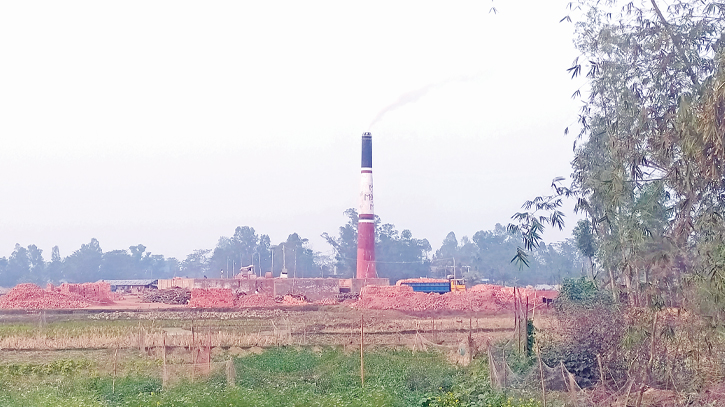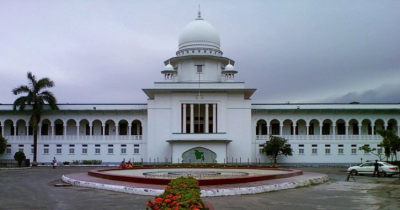
Photo : Messenger
Illegal brick kilns have sprung up on agricultural land, wreaking havoc on the environment in Banskhali upazila of Chattogram. The illicit operation of these kilns has raised alarms due to their adverse impact on the surroundings.
Three brick kilns have been established in Ilsha village of Baharchhara union within the upazila. These kilns, notably one situated in close proximity to residential areas and educational institutions, are operating at full capacity, exacerbating the situation.
Visiting Ilsha village in Baharchhara union reveals approximately 25 to 26 bigha of arable land razed to accommodate the kilns. They stand a mere 30 yards away from the LGED-paved road on Baharchhara beach road, posing a significant threat to the locality, especially given their close proximity to the tide.
The illegal brick kilns, namely Al Madina, Chowdhury Bricks-1, and Chowdhury Bricks-2, have been constructed amidst cropland, where hill wood and soil are continuously burnt, with wood instead of coal being the primary fuel source. These kilns blatantly disregard modern, eco-friendly coal usage and chimney regulations, resulting in the outbreak of various diseases in the area and causing detrimental effects on agriculture, including mango crop losses.
The Brick Making and Kiln Installation (Regulation) Act of 2013 explicitly prohibits the use of topsoil for brick kilns, with penalties including imprisonment and hefty fines for offenders. Despite these laws, the prevalence of illegal brick kilns remains rampant in the upazila, with 12 out of 14 kilns operating unlawfully, encroaching upon salt fields, croplands, settlements, and educational institutions.
Local sources report the construction of new kilns in previously untouched areas, further intensifying environmental concerns. The illegal operations not only harm the environment but also disrupt agricultural activities, leading to reduced crop yields and affecting the livelihoods of local farmers.
Authorities, including the Environment Directorate and the Department of Agriculture, have been called upon to address the situation urgently. The need for strict enforcement of regulations and penalties against illegal brick kilns is paramount to safeguarding the environment and ensuring sustainable development in Banskhali upazila.
Farmers like Sayed Noor lament the loss of agricultural land to brick kilns, highlighting the adverse effects on crop production and livelihoods. Their voices, along with concerns raised by officials and environmentalists, underscore the urgency of tackling this pressing issue.
In response to these revelations, Banskhali Upazila Nirbahi Officer (UNO) Jasmine Akhtar has pledged to take necessary action, emphasizing the importance of collaboration with relevant departments to mitigate the adverse effects of illegal brick kilns on the environment and local communities.
Brick kilns pose a grave threat to the environment and ecology due to several reasons. Firstly, their operation involves the indiscriminate burning of wood and soil, leading to deforestation and soil degradation.
This results in habitat loss for wildlife and disruption of natural ecosystems. Additionally, brick kilns emit harmful pollutants such as carbon dioxide, particulate matter, and toxic gases, contributing to air pollution and climate change. Furthermore, the encroachment of kilns on agricultural land reduces crop yields, threatening food security and livelihoods.
Therefore, the government must take initiative to ban illegal brick kilns to protect the environment, preserve biodiversity, mitigate climate change, and safeguard public health.
Messenger/tareq








